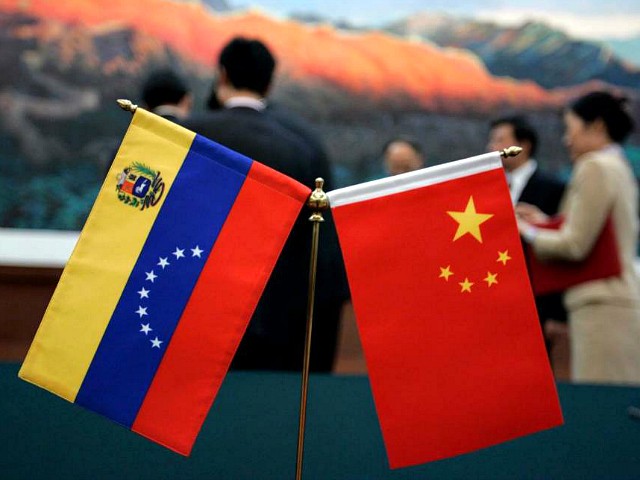Venezuelan dictator Nicolás Maduro met with China’s Latin American envoy, Cai Wei, on Tuesday in Caracas to discuss bilateral relations between the two countries, Maduro announced on social media.
The visit — to an antagonistic leader to the United States in a country about 1,000 miles away — follows a meeting between Speaker of the House Nancy Pelosi (D-CA) and the president of Taiwan, Tsai Ing-wen, which prompted an outpouring of rage from Beijing and its communist allies.
Maduro’s official Twitter account shared Venezuelan press footage of the leader’s meeting with Cai on Tuesday that showed Maduro receiving the envoy alongside “Venezuelan Minister for Communication and Information Freddy Ñáñez, [and Maduro’s son] Deputy Nicolás Maduro Guerra,” as identified by Venezuela’s Orinoco Tribune.
“Earlier, on Monday, Wei participated in a meeting with the Venezuela-China Parliamentary Friendship Group at the Federal Legislative Palace. National Assembly Deputy Nicolás Maduro Guerra, who heads the group, stated that the meeting reaffirmed the brotherhood of the two nations, ‘forged in solidarity and dignified resistance,'” the Orinoco Tribune relayed.
Venezuelan Foreign Minister Carlos Faria also met with Cai, the director-general of the Latin American division of the Chinese Foreign Ministry, separately on August 2, the Venezuelan newspaper Ultimas Noticias reported.
“We met with General Manager for Latin America and the Caribbean of the Chinese Foreign Ministry, Cai Wei. Our peoples ratify the path of brotherhood, solidarity and mutual cooperation. Venezuela and China will continue to strengthen their bilateral relations,” Faria wrote in a Twitter post documenting the August 2 talks.
“Our peoples ratify the path of brotherhood, solidarity and mutual cooperation. Venezuela and China will continue to strengthen their bilateral relations,” he stated, adding, “We stand in defense of peace and firm in the construction of a multicentric and multipolar world!”
Maduro oversees a socialist regime that has ruled Venezuela since 1999, first under late dictator Hugo Chávez. The Western world has viewed Maduro’s rule as illegitimate since about 2018 after he was re-elected through a presidential election rife with allegations of fraud.
Venezuela’s welcoming of a Chinese foreign ministry delegation on August 2 likely served as an attempt by Beijing to project a powerful image abroad in the face of Pelosi’s visit to Taiwan this week. The visit angered Beijing, which considers Taiwan a province of China that should be “reunified” with “the mainland,” or China.
Taiwan is an independent island nation located off China’s southeastern coast. It successfully operates based on its own constitution and democratically-elected government. Pelosi became the highest-ranking U.S. government official to visit Taiwan in 25 years when she landed in its national capital, Taipei, on August 2. Her visit to Taiwan ended on August 3.
The U.S. government has historically abided by the “Taiwan agreement,” which is an unofficial name for a policy outlining Beijing and Washington’s relationship with Taipei. America officially maintains diplomatic ties with China rather than Taiwan in accordance with the policy.
The Taiwan Relations Act, which the U.S. Congress passed in 1979, supports the “Taiwan agreement.” The legislation “makes clear that the U.S. decision to establish diplomatic ties with Beijing instead of Taiwan rests upon the expectation that the future of Taiwan will be determined by peaceful means,” Reuters recalled in October 2021.
“While that act binds the United States to provide Taiwan with the means to defend itself, Washington only acknowledges China’s stance that the island belongs to it and that there is ‘one China,’ and takes no position on Taiwan’s sovereignty,” according to the news agency.
